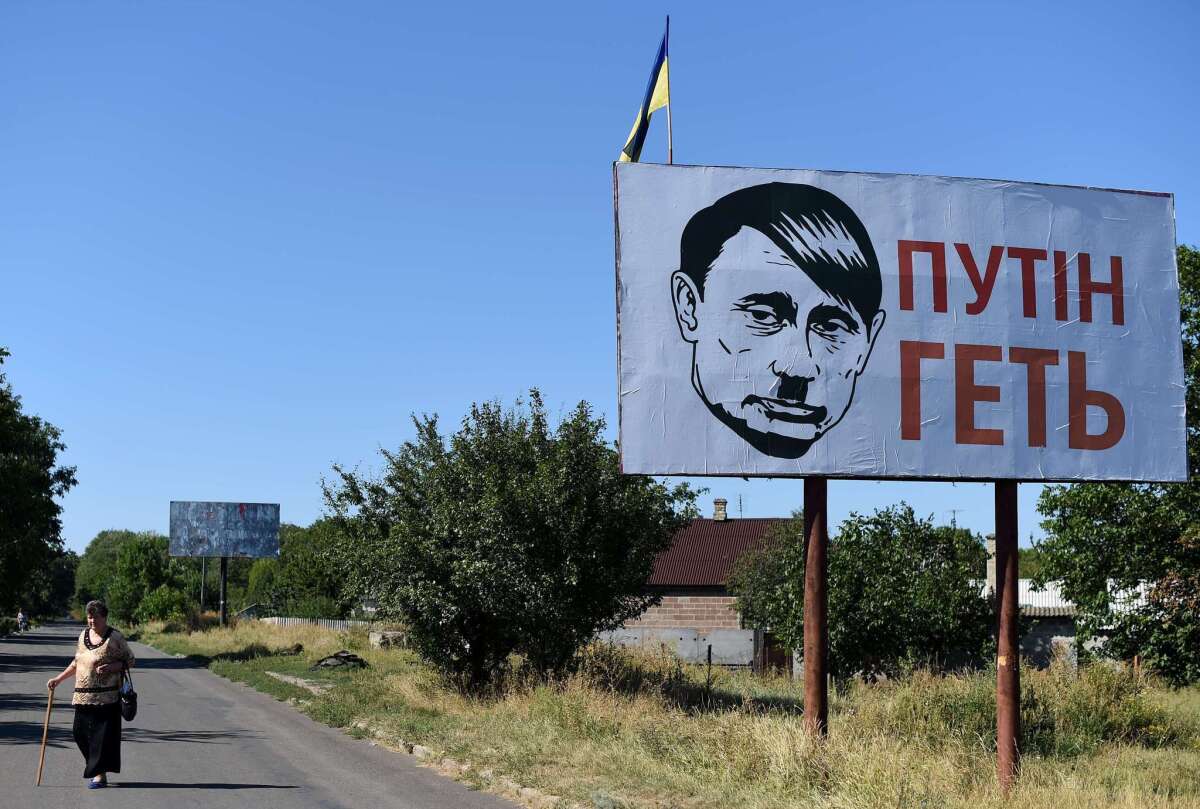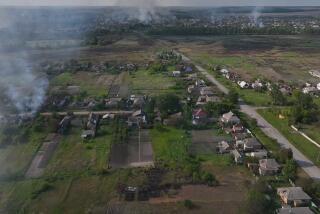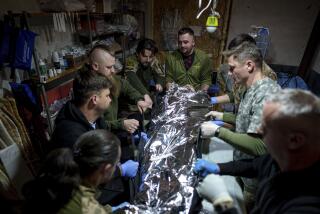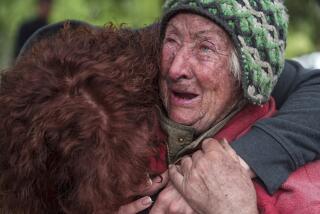Amid talk of truce, leader of small Ukrainian town fears an attack

- Share via
Reporting from Volnovakha, Ukraine — If a cease-fire deal is near between Kiev and Moscow, it hasn’t calmed the nerves of Mykola Byshkov, the head of the regional administration for this strategically located town in eastern Ukraine.
In the last several days, pro-Russia separatists have retaken several villages to the north of Volnovakha, which is set along the road between the government-held city of Mariupol and the separatist stronghold of Donetsk.
Ukrainian forces had been using those villages to stage attacks on Donetsk, and they had been making progress in their battle to reunite the region with the rest of the country.
That all changed on Aug. 27, the Ukrainian government says, when Russian troops and heavy artillery moved into the area and began backing up the separatist fighters of the self-declared Donetsk People’s Republic.
The separatists advanced, the military retreated, and Volnovakha was left without protection, Byshkov explained in his office in the town’s center.
“Our town’s story will just be another tragic story in this war,” he said, visibly shaken as he described how helpless he was to protect Volnovakha, home to about 24,000 people. “We were protected by the Ukrainian army, but now they have just left us, and the town is wide open now.”
Byshkov’s confusion and worry about what his next moves should be were compounded by the fact that he had few instructions from the Kiev authorities, who he felt had forgotten about his provincial region stuck between the big metropolis of Donetsk and Mariupol’s port on the Azov Sea about 60 miles to the south.
Then came Wednesday, with contradictory reports of a possible truce. Ukrainian President Petro Poroshenko first said the two governments had reached a permanent cease-fire agreement. Moscow shortly afterward announced that such an agreement would be impossible because, as it maintains, Russia is not a player in the domestic Ukrainian conflict.
Meanwhile, the separatists said they would not agree to a truce until Ukraine moved all its forces out of the region.
By the end of the day, Putin had released a set of seven steps he said would lead to a peace settlement, including Ukraine’s removal of all heavy artillery within range of civilian areas and a call for all combatants to stop their advances. Both sides of the conflict have been accused of using heavy artillery and missiles in populated areas, including the villages north of Volnovakha.
The largest town on the road between Mariupol and Donetsk Volnovakha also straddles the railroad link between the two cities.
With the front line now less than 20 miles away in Olenivka, Byshkov said, he fears it is only a matter of days before Volnovakha becomes the next headline-grabbing battle in this conflict, which has already claimed more than 2,600 lives and forced as many as 1 million people to evacuate their homes.
“People are not living a normal life here, they are living in a time of war,” said a woman who was walking in Volnovakha’s city center with her two daughters. The city has been without water since June 11, when shelling destroyed a pumping station. The woman gave only her first name, Lyudmila, like many others who have requested that their last names not be used for safety reasons. She said she and her children were planning to stay with relatives in Odessa.
Even as news of a possible cease-fire was breaking, separatists said they had taken control of Telmanove, on another strategic road linking Donetsk with the southeast coast on the Sea of Azov.
Among eastern Ukrainians who have lived through two other cease-fire announcements and watched as heavy artillery fire continued to claim the lives of neighbors and destroy the region’s economy, Wednesday’s announcement was received with skepticism and rolling eyes.
“How many times have we already heard this before? It means nothing,” said Roza, 34, who was shopping in Mariupol, which has recently been threatened by the separatists’ advance. “Nothing will change. We just want to go back to our normal lives.”
The Kiev-appointed governor of Donetsk, Serhei Taruta, also seemed unsure of the status of the cease-fire late Wednesday and said he was not consulted about the process.
“If we can control the border [with Russia], then we will be able to solve our local problems in one month,” he said at a news conference in Mariupol. “If Russia says it doesn’t participate in this conflict, then it must help us control the border.”
Ayres is a special correspondent.
More to Read
Sign up for Essential California
The most important California stories and recommendations in your inbox every morning.
You may occasionally receive promotional content from the Los Angeles Times.











